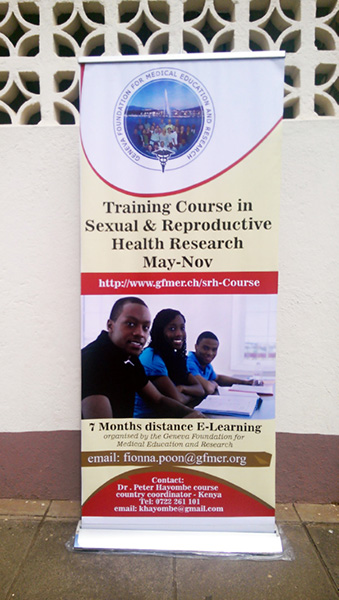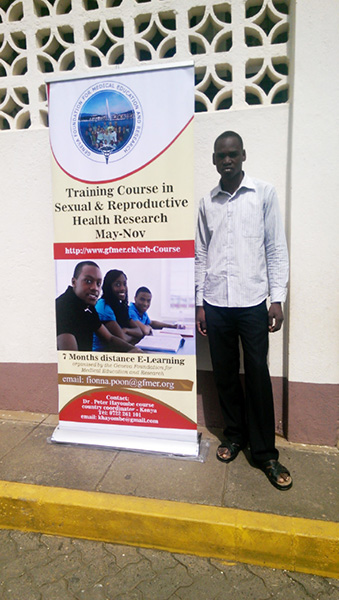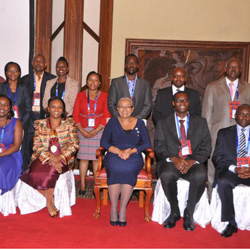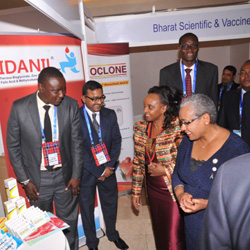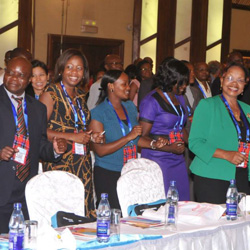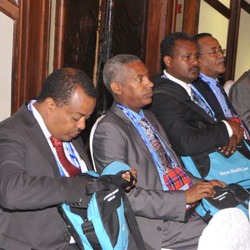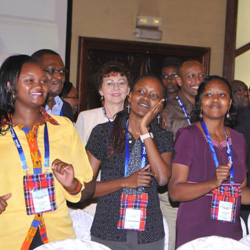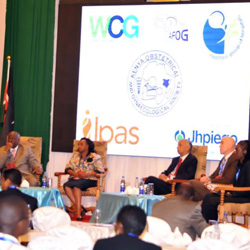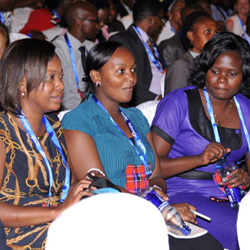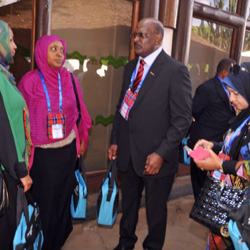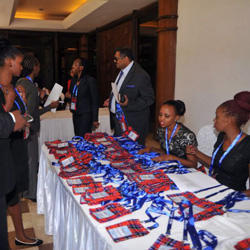GFMER participation at the 40th Kenya Obstetrical and Gynecological Society Conference, Kisumu 2016
Peter Otieno Khayombe - GFMER Scientific Collaborator
February 17-19, 2016
Acacia hotel, Kisumu, Kenya
This is a report of our participation at the 40th Kenya Obstetrical and gynecological Society (KOGS) conference 2016. The KOGS has been in existence since 1974 and has grown to a current membership of more than 300 specialists and professionals, with five branches in Mombasa, Eldoret, Nakuru, Nyeri and Western. Over the years KOGS has made great strides in the advocacy for the advancement of women’s reproductive health and rights by working with the government and other stakeholders in policy formulation and implementation; promotion of maternal and neonatal health in the country; providing an avenue for information sharing on best and current Obs/Gyn practices through periodical publication of the JOGECA just to mention a few.
The theme for this conference was Delivering Reproductive Health Services in a Devolved Health System: Challenges and opportunities The event was a three days conference held from 17th to 19th February, 2016 in Acacia hotel Kisumu. A total of 312 members and invited guests attended the conference from different countries. There were representatives of the International Federation of Gynecology and Obstetrics (FIGO) from Europe, America, Asia and African continent.
The event was officially opened by the first lady Her Excellency Margaret Kenyatta on 17th February 2016. Her Excellence has a project for reducing maternal and newborn child health called beyond Zero. She has been organizing for funds for the provision of mobile clinics to increase the health infrastructure in the country. Over twenty pharmaceuticals companies attended the conference most notable ones were Syngenta, Pharma among others. A number of health partners were also involved, UNICEF, UNFPA, UNEP, USAID, JICA and JHPIEGO among others.
The conference identified many challenges affecting the devolved health in the counties including insufficient human resources, equipment and drugs, infrastructure and finance.
Many opportunities were also identified for the counties in terms of partnerships for health from like minded health service providers from both national to international.
At the GFMER stand we had 350 brochures which we distributed to the conference attendants during the three days event. We also had a burner which introduced the GFMER course.
The First Lady her Excellency Margaret Kenyatta’s Speech
Distinguished Delegates,
Ladies and Gentlemen,
It is an honour for me to address the first African Federation of Obstetrics and Gynaecology Congress and the 39th Kenya Obstetrical and Gynaecological Society members.
On my own behalf and on behalf of the Government of Kenya, I welcome you to our beautiful country. While you are here, remember to sample some of our world re-known tourist attractions.
This meeting is a great milestone for our continent as it charts the way for a future of co-operation that is bound to greatly diminish the instance of maternal and children mortality and morbidity due to knowledge sharing among our medical professionals.
"Women should not die giving life". When it happens the newborn and children suffer ten times more the risk of dying prematurely. Although maternal mortality in Africa has dropped by 40 % in the past two decades, it remains intolerably high at 800 maternal deaths daily.
Globally, over a quarter million women die each year from pregnancy and delivery-related complications, with most of these deaths occurring in Sub-Saharan Africa. This is unacceptable especially as half of the mortalities occur during the process of labour and the causes of these deaths are preventable.
A concerted push is needed as only a few countries in Africa are on track to reach the Millennium Development Goals 4 and 5 on child and maternal health. Improved healthcare for women translates to their families, communities and the society having productive citizenry that can realize their full potential in life.
What plagues Sub-Saharan Africa reproductive, maternal, neonatal and child health? We have failed to recognize healthcare as an imperative right for all.
Furthermore, illiteracy, poverty, negative socio-cultural practices; limited resources; and lack of community engagement and ownership, all compound the problem of effective service delivery.
Social determinants of health such as early marriages, teenage pregnancies, lack of choices and autonomous decision-making all work towards disempowering women and girls in Africa. Pregnancy is further aggravated by communicable diseases such as HIV, Malaria, tuberculosis and increasingly from non-communicable diseases such as diabetes, hypertension, heart ailments, kidney disease and cancers.
Today's meeting, is in keeping with global commitments such as Every Woman, Every Child; State of the World's Midwifery; the Campaign of Accelerated Reduction of Maternal Mortality in Africa and the Beyond Zero campaign in Kenya.
This coming together of obstetricians, gynaecologists, implementing partners and other stakeholders is significant to the attainment of the commitments by these global initiatives.
There is need to spearhead efforts in the continent through advocacy, strengthening of the health delivery system, conducting of research to inform policies and practices, and enhancement of the quality of services to avert morbidity and mortality. We all need to critically appraise the bottlenecks, fast-track interventions and innovations to save more lives.This is the perfect forum to see how we can best leverage the great tools at our disposal through Information Technology (IT) for Sexual Reproductive Health and Rights.
As demonstrated all over our continent, IT is a great asset which can enable us to solve many problems that plague us in the health sector.
The recent surge in the emphasis on health and fitness devices in technology firms is the perfect opportunity for us to see how we can best adopt health monitoring technologies to benefit our mothers during pregnancy and after childbirth.
As I declare the African Federation of Obstetrics and Gynaecology Regional Congress and Kenya Obstetrics Annual Scientific Conference officially open, I wish each one of you becomes a possibility thinker for Africa: "we can and we will sustain".
Our mothers, children and families depend on experts like you to deliver that difference.
Thank you.
Images
